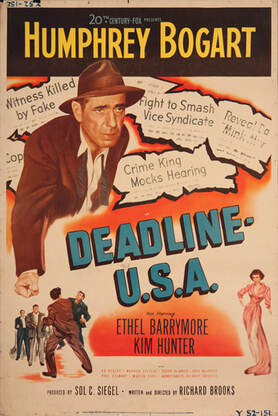 Recently a good friend read my history of StarText -- a very early online initiative I was privileged to be a part of -- and it piqued his interest in learning more about newspapers. How they operate; what goes on behind the scenes, and more importantly, how the heck do they gather and print all that news 365 days a year. All good questions. To that last point, I think it even amazes those of us in the business. In fact, we call getting a newspaper out on the street every 24 hours "the daily miracle." For me, the choice of a newspaper career goes back to high school, when I landed a spot on the school paper, "The Poly Parakeet." (The school was Polytechnic HS, and our mascot -- don't laugh ...oh, go ahead -- was the Parrots.) Actually, in truth it predated that: I was editor of my sixth grade paper, The Eastland Eagle. We printed the Eagle on mimeograph paper and stapled the pages. I even had to draw an eagle on the front, which convinced me not to pursue a career in art, by the way. At any rate, longtime newspaper people see it as a calling, populated by people with "ink in their blood." Maybe for me it came honestly. My paternal grandfather worked both on newspapers and as a commercial printer, retiring at age 75. Working on the high school paper was like a dream come true. Under the tutelage of Dorothy Estes, our amazing, smart and dedicated faculty adviser, I got to write columns, cover sports, pen editorials and eventually, become co-editor. Even more exciting, in my senior year I joined a Junior Achievement group sponsored by the Fort Worth Star-Telegram, our local newspaper of distinction. Once a month we got to publish our work on a special page. It was the first time my byline appeared in the paper my parents read on a daily basis. Of course, I had no idea a few years later I would working there and become the Star-Telegram's first fulltime rock music writer, as well as a number of other jobs. So, getting back to those questions ... The first thing I would say about how newspapers do what they do is this old axiom: "Nothing happens at a newspaper without a deadline." That pretty much guides everything. In prior days, newspapers published multiple editions. At the Star-Telegram, we had a State Edition that was printed first. That's because as soon as it came off the press, it was loaded on trucks bound for distribution to cities mostly west of Fort Worth. During its early history, the S-T was the paper of record for a large part of West Texas. Then we might print an early City Edition, a Home Edition and a Final Edition (which wasn't really final if big news broke, which might result in an Extra Edition.) At that time, there was both a Morning paper and an Evening paper, as well of course as a massive Sunday paper. Each had their own multiple editons. All of which is to say there were strict deadlines for every edition. My initial job at the S-T was copy editor. Copy editors had to review, edit and write the headlines for all the stories that found their way into print. (As the joke goes, "Four years ago I couldn't spell 'journalist,' and now I are one.") At the S-T, there were five or six of us assigned at that time to the Evening Edition. We worked around a big horseshoe desk, manned by the Copy Desk Chief. As reporters worked against their deadlines, we did the same, which meant the pressure was on to craft the perfect headline that captured the essence of the story as well as the interest of the reader. Tabloids make a living on headlines -- the more outrageous, the better. Like the classic, "Headless Body Found in Topless Bar." We had our share of those -- they just never made it into print. But every department at a newspaper has a deadline: Advertising, Composing (where the pages are assembled), the Press Room (where the papers are printed), Circulation (which distributes the paper) and so on. One missed deadline and there's a ripple effect right down the line. That's a big factor in the "24-hour miracle." Every department has to be in sync with every other department to ensure news and ads flow efficiently onto a page that is printed, packaged and ultimately delivered to your doorstep -- all for less than the cost of a pack of chewing gum. Of course, like everything, costs always go up. And over my career, I've seen newspapers transition from hot type assembled by union workers wearing green eyeshades to designers sitting at oversized monitors using ever-more-powerful computers. But by far the biggest game-changer was the Internet. While StarText had a running head start on the technology, it was only a whisper of what was to come. For many entrenched businesses, the birth of the World Wide Web meant either opportunity calling or disaster looming. For newspapers, it's been both. Today we find ourselves in a 24-7 information tsunami -- some real, some fake -- filtered through globe-spanning social networks. As a result, the need, or desire, for the printed page has steadily declined and the local newspaper, considered the cornerstone of our democracy, is facing the same fate as the dinosaurs. It's not only sad, but also downright scary. We can only hope that regardless of what form information may take -- printed, digital or the "next big thing" -- our thirst for the Truth will keep the fires of journalism lit.
Marty Zimmer
9/9/2019 12:00:24 pm
Gerry, thank you for this informative article. The 24 hour miracle is right. It still amazes me to get a paper at my front door every morning with yesterday’s news. Thanks for your service to all in Fort Worth. Any of your favorite headlines you remember? By the way. Don’t edit my response. Thanks again.
Gerry Barker
9/9/2019 04:53:40 pm
Good observation about paperboys. One summer I had a job delivering the Fort Worth Press, the smaller rival to the Star-Telegram. Luckily, it was a tabloid and didn't require those huge pouches. Every year I always felt sorry for whoever had to deliver the Thanksgiving paper, traditionally the biggest of the year with all the sales inserts. Now days it's more about Black Fridays sales on the Internet. Times do change. Comments are closed.
|
AboutYes, I know it's spelled like "Jerry." No, I don't know why it's pronounced "Gary." Archives
May 2024
Categories |
- Home
- Cruise/Travel
- Gigi in the 561
- Blogs
- Video
-
Explore
- Snaps >
- Island Destinations
- October Odyssey >
- Pam - Traveling in Style
-
Road Trip!
>
- Road Trip! -- Tucumcari, New Mexico
- Road Trip! -- The Painted Desert
- Road Trip! - Sedona, Arizona
- Road Trip! - Sedona Wineries
- Road Trip! Tonto Natural Bridge State Park
- Road Trip! - Mogollon Rim
- Road Trip! - Verde Canyon Railroad
- Road Trip! - Jerome, Arizona
- Road Trip! - California
- Road Trip! - Palm Springs Celebrity Tour
- Road Trip! - Palm Springs Aerial Tramway
- Road Trip! - Festival in Palm Springs
- Road Trip! - Willcox, Arizona and Apple Annie's Orchard
- Road Trip! Willcox Wineries
- Road Trip! Chiricahua National Monument
- Road Trip! Tombstone, Arizona
- Tombstone, Part Two
- Road Trip! - Epilogue
-
Traveling With Joe
>
- Beartooth Highway
- North Cascades National Park
- A Visit to the Philippines
- Grand Canyon National Park
- Glacier National Park
- Yellowstone National Park
- Hiking in Bear Country
- Crater Lake National Park
- Albuquerque Balloon Fiesta
- The Kerrville Folk Festival
- Building Hope in the Rio Grande Valley
- Yellowstone Camping Tales
-
Unknown Yellowstone
>
- Unknown Yellowstone - Heart Lake
- Unknown Yellowstone - Summit Lake
- Unknown Yellowstone - Shoshone Lake
- Unknown Yellowstone - Grizzly Lake
- Unknown Yellowstone - Riddle Lake
- Unknown Yellowstone - Pelican Cone
- Unknown Yellowstone - Mt. Washburn
- Unknown Yellowstone - Specimen Ridge
- Unknown Yellowstone - Avalanche Peak
- Unknown Yellowstone - Divide Creek
- Contact
- Search
|
© COPYRIGHT 2024 ALL RIGHTS RESERVED.
|

 RSS Feed
RSS Feed
